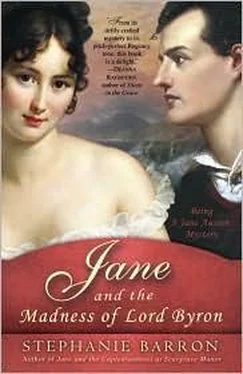“If General Twining must be mercenary, I wonder that he did not promote his daughter’s prospects,” I observed. “Miss Twining felt herself doomed to a marriage she could not like — with a clergyman, greatly her elder. But perhaps there was a fortune in the case.”
“You cannot mean Mr. Smalls?” Mrs. Alleyn laughed. “No fortune whatsoever, my dear. Such a match is in every way inexplicable; unless one assumes that the father was determined to destroy every hope in the female breast. So grim and humourless as he is! I make it my business to avoid any meeting with the General — and can only pity what his daughter’s life must have been. Perhaps she drowned herself in despair! I can believe such a thing more readily than that Lord Byron killed her. But I detain you — Mrs. Silchester is at liberty, Sir John having quitted her; you will observe her by the bow window — the frail-looking lady, in the dove-grey. Louisa!”
Drowned herself in despair . It was a thought, indeed; and had Catherine Twining been discovered cast up on the shingle, and not sewn into a hammock in Lord Byron’s bed, I might have accorded Mrs. Alleyn’s views more weight. But Henry had said there were marks of brutality at the girl’s throat; she was no victim of self-murder. Someone had deliberately held her head beneath the waves.
Lady Swithin having been claimed by the fellow named Hodge, who was determined to teach her how to cast the bones, Mrs. Alleyn presented me to the tiny Mrs. Silchester, adding with an attempt at carelessness, “Miss Austen was a little acquainted with that unfortunate child, Miss Twining, you know.”
Mrs. Silchester started and her eyes widened, as tho’ I sported a Gorgon’s head. She pressed one hand to her breast; both breast and hand were bony; and I concluded that the lady suffered from a nervous complaint, excited by the least novelty. “You knew poor Catherine?” she whispered. “But how ? I thought you quite a stranger to Brighton, and all our little concerns!”
I should hardly describe murder as a little concern , but having no desire to frighten the lady further, I merely said: “I met Miss Twining in Cuckfield, on my journey hither. Indeed, we met under rather unusual circumstances.”
That Mrs. Silchester understood my allusion, I readily perceived by her repressive look at Mrs. Alleyn. That far-too-penetrating lady, her object achieved, merely said, “You will have much to talk over, I suspect,” and left me to my quarry with a nod and a smile.
“So it was you, I collect, who tore her from the Fiend’s clutches in the stable yard? You, who delivered her from that unhappy state of bondage?” Mrs Silchester whispered.
“I and my brother. We were happy to be of service to Miss Twining.”
“But, alas, her enemy proved too strong for us all.” Mrs. Silchester’s eyes closed, and her face blenched; she groped for support, and found only the bow window.
“I am sure you are unwell. Will you not sit down? On this sopha, perhaps?”
I led the frail being to a settee placed at an angle to the window, where she leaned back against the cushions a moment. Her countenance was dreadful. “If you could search out my vinaigrette,” she said faintly, thrusting her reticule into my hands. “When I consider of that poor child — so young, so innocent, a mere dove among wolves — ”
I loosed the strings and felt in the depths of the fabric bag; the vinaigrette was there, of course — no lady of Mrs. Silchester’s demeanour could travel far without it. I removed the cap and wafted the bottle under my companion’s nostrils. She gasped, pressed her fingers to her lips, and stared at me with welling eyes.
“You are unmarried, Miss Austen, but I am sure you cannot be entirely ignorant of the world.”
“No indeed.”
“Then you apprehend what beasts men are.”
“In every person, I believe, there is the potential for bestiality — as well as for good.”
“Not in Lord Byron,” she said heavily. “He is entirely evil. The sort of evil Lucifer knows, that walks with an angelic face. I say so, Miss Austen, tho’ the world acclaims him as a god; I want nothing of such idolatry. He killed poor Catherine because she saw him for what he was; she feared rather than loved him; and he could not endure to be repulsed.”
“You are very sure in your accusations, ma’am, but it would appear not all the facts are yet known. Lord Byron may be innocent.”
“Innocent! A falser word could never apply!” She struggled upright on the sopha, and seized her vinaigrette. “Since that Fiend came to Brighton, my poor Miss Twining has known not a moment’s peace. Those who are little acquainted with that man’s character like to say it is sailing , and the promise of good Society, that drew him here in defiance of Lady Oxford’s wiles — but I know better! It was poor Catherine he sought, and Catherine upon whose frail body he slaked his vile lusts!”
Such language from so fragile a creature could not but be shocking; and had I been ignorant of Miss Twining’s history — known nothing of the attempted abduction at Cuckfield — I might have judged Louisa Silchester a prey to fancies of the most lurid type, a creature enslaved to novel-reading and Gothick romance. But I had seen the cravat knotted around Miss Twining’s wrists, had seen Lord Byron’s countenance alter to something just short of demonic, upon the discovery of her liberation. I could not dismiss Louisa Silchester, however excessive her language.
“When did his lordship first meet Miss Twining?” I asked her.
“Some three weeks since, when she was sent home from her seminary in Bath.” Mrs. Silchester dabbed at her eyes with a square of lawn. “Poor, dear child. Such an innocent, always. She had conceived a passion for a well-born young officer whose estates were in that part of the country — and dismissal was the result!”
“Indeed!” This was news of primary importance; Henry’s Unknown made a tentative appearance. There had been a rival to Mr. Hendred Smalls — and a prior claimant to the heart Byron had so boldly besieged.
“Miss Twining in love!” I exclaimed. “She said nothing of this to me.”
“She kept the matter very close, in terror of the General. I confess I do not even know the young gentleman’s name, for she would never tell it to me. But I have thought of him often, in the hours following her death — and wondered how the intelligence was to reach him.…”
“The General did not look with favour on a brother officer — and one in possession of estates?” I asked in some puzzlement.
Mrs. Silchester shook her head. “When Catherine’s childish infatuation was penetrated by her headmistress, a letter to the General was the unfortunate result. The General sent for his daughter immediately, and threatened to keep her so close she might never see the light of day again — but that I persuaded him to let me try what a little judicious chaperonage might do. I thought it very likely that the Brighton Season should put all thought of officers out of her head. And the General agreed! He trusted me to put all right! I do not know how I am to meet with him now. His reproaches — ”
“And Lord Byron?” I persisted. “That affair began some few weeks ago?”
“ — He glimpsed her, as I understand, in the Promenade Grove. He fell instantly in love — sent round a tribute of flowers to Church Street that very afternoon — begged to be introduced to the General, which favour was immediately repulsed; and left again for London in flat despair. We congratulated ourselves that he had been defeated — for it would never do, you know, Miss Austen, to encourage the pretensions of such a person; his reputation for vice is so very bad . And he has no fortune to speak of — only debts, which intelligence the General naturally procured, before repulsing his lordship entirely.”
Читать дальше












